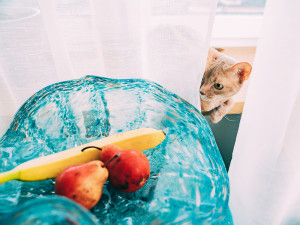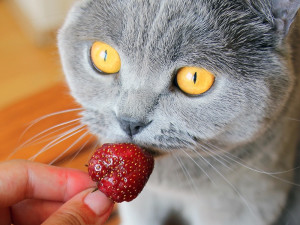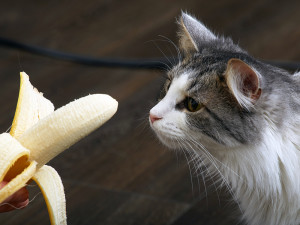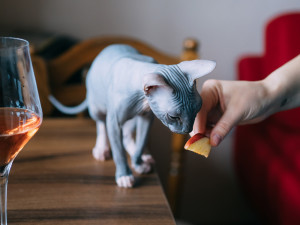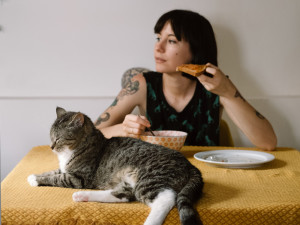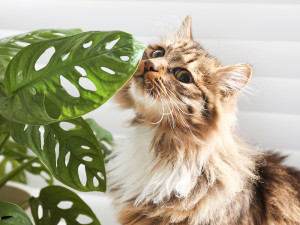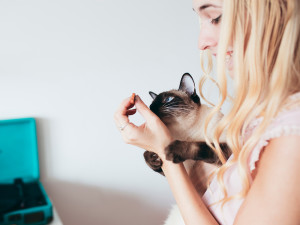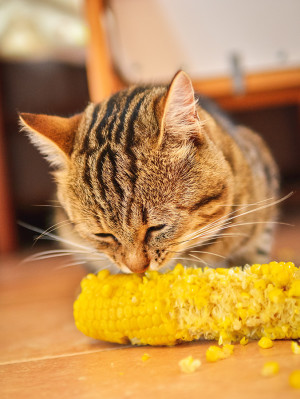Can Cats Eat Grapes?
This is one you’ll want to bookmark.
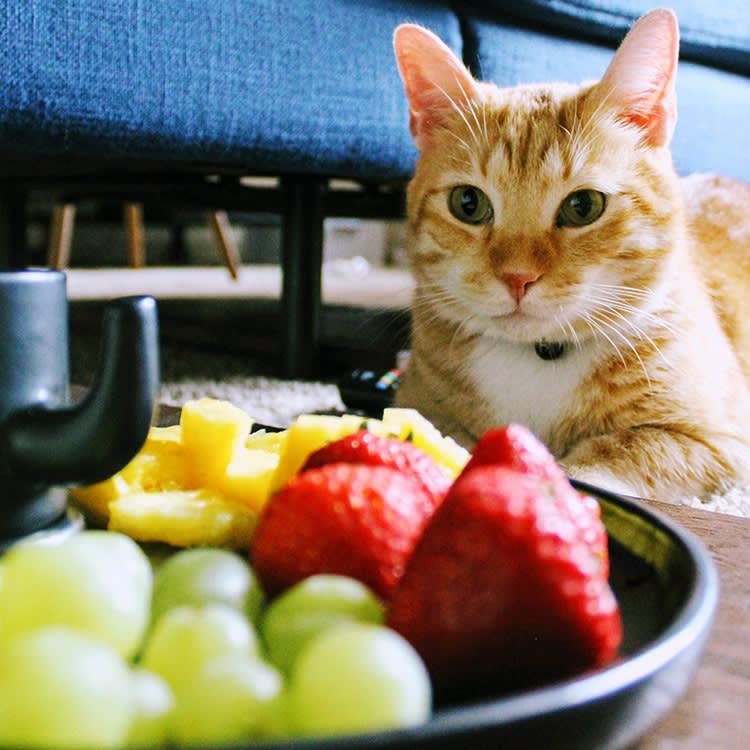
Share Article
Grapes and their cute little shriveled up cousins, raisins, make delicious sweet treats for us, but this is one food that you definitely should not share with your cat. Cats should not eat grapes or raisins because they contain toxins that can cause serious illness, including kidney failure. There is still a lot that veterinarians are learning about grape and raisin toxicities and the actual toxins within them.
More documented cases of toxicities have occurred in dogs than cats, so much of the information we have comes from studies in dogs. This may be because dogs are just more likely to devour a bunch of grapes compared to cats, who have very refined, selective palates. It may also be the case that the toxins have a more serious effect in some species versus others. For now, the best way to play it safe is to keep grapes and raisins safely out of reach of your cats and any other pets in your house.
Nutrition facts for grapes and alternatives for cats
There’s nothing cuter than watching your cat tilt their head with curiosity as they are exploring new foods, batting them around, and maybe even taking a bite, so you may be wondering what kinds of human foods are safe for your kitty to investigate. While there are many human foods that you can safely feed to your cat in moderation, grapes are not in that category.
Grapes contain many beneficial nutrients for humans, including antioxidants, fiber, and important vitamins and minerals, but they are unfortunately toxic to cats. All efforts should be made to keep them out of reach. This is also the case for raisins, currants, and sultanas, all of which are part of the plant genus known as Vitis.

The good news is that your cat’s primary diet contains all of their necessary nutrients and more as long as it is labeled as being complete and balanced opens in new tab as a daily diet. If you are looking for ways to provide an extra boost of these nutrients, too, there are other foods that you can offer to your cat that are safe and delicious.
Antioxidants: Antioxidants can protect cells against damage from free radicals and have benefits throughout the body. Blueberries are also packed with antioxidants and can be safe for cats in small amounts.
Fiber: Fiber helps to feed the good bacteria in the gut and prevent constipation. Many other fruits and vegetables contain fiber, including pumpkin, and this can be a safe, occasional treat for your cat. For cats that have ongoing health problems related to constipation, a special diet may be more beneficial so be sure to consult your veterinarian.
Vitamins and minerals: Fruits and vegetables also tend to be great sources for many important vitamins and minerals. If you want to give your cat an extra serving, there are many options that are safe for the occasional taste or treat.
Are grapes good for cats?
Grapes are not good for cats because they contain toxins that can make them very sick. For a long time, veterinarians have known that grapes and raisins are toxic to pets, but it was only recently that we have come closer to identifying their toxic propertiesopens in new tab. Studies of damaged kidneys after grape toxicity suggest that it is very similar to the damage from toxins in the baking ingredient Cream of Tartar and the tamarind fruit.
All of these foods contain potassium bitartrate, which is a salt of tartaric acid. Other plants also contain this toxin if they are members of the genus Vitis, including currants and sultanas. When ingested, these toxins can cause multiple toxic effects. Some common signs of toxicity include:
vomiting
diarrhea
belly pain
loss of appetite
lethargy
signs of kidney failure: urinating large amounts, drinking a lot of water, or not urinating at all in later stages
If you see your cat eat grapes or you find the shredded evidence that maybe they got into them when you weren’t watching, contact your vet and a pet poison control hotline right away. Depending on the quantity and the timeframe of when you think they were eaten, your vet may recommend treatments including inducing vomiting, monitoring your cat’s kidney values with serial bloodwork, and/or hospitalization with IV fluids and other medications to protect the kidneys and digestive tract.
Can cats eat grape leaves?
Toxicologists believe that the toxic compound is only found in the fruit of the grape itself, so the leaves are not thought to contain this toxin. It would most likely be OK for a cat to nibble on a leaf, but consuming a large amount of these leaves could lead to digestive upset including vomiting and diarrhea and would not be recommended anyway.
Can cats eat products with grape flavoring?
Many processed products, such as jam or grape juice, are usually detartrated, meaning they may contain little to no potassium bitartrate. This makes them much less likely to have toxic effects. This is also often true of products that have been heated, such as baked goods containing grapes or raisins. The amount of potassium bitartrate in different products can vary, however, and should be avoided to be safe.
Are grapes completely safe for cats?
Grapes are one of those foods that should never be shared with your pets and should be kept out of their reach. There is still more to uncover about grape toxicities for cats as there have not been enough studies to know the full story yet. Given what we know at this point, the safest option is to avoid feeding grapes, raisins, currants, or sultanas to your cat and find other treats to share with your cat that are healthy and safe.
The bottom line: Can cats eat human food?
When it comes to sharing your food with your cat, it’s always important to double-check that what you are offering is safe for your feline friend. There are many foods that are safe in moderation, but there are also some foods we eat all the time that are surprisingly toxic to cats.
If in doubt, consult your vet before offering something new. Always make sure that what you offer is free of spices and oils that could be problematic for your cat, even if the main ingredient is safe.
And be sure to avoid foods that may be a choking hazard or cause injuries to your cat’s digestive tract, such as foods with bones, shells, toothpicks, or skewers. And finally, remember that cats have very unique nutritional requirements so they must get the bulk of their diet from a balanced cat food diet. The occasional scrap of human food may be a delicious treat, as long as it is less than 10 percent of your cat’s total diet. Most important of all, be sure to provide your kitty with appropriate, nutritionally balanced cat food.
Other foods that are good for cats:
If you are looking for healthy snack options to share with your cat, consider some of these:
Watermelon can be a refreshing treat to share with your kitty.
Peanut butter is high in protein and good fats.
Apples are a great source of fiber and many important vitamins.
Other foods that are dangerous to cats:
Garlic is toxic to cats and can cause a life-threatening anemia.
Onions are toxic to cats and can cause fatal health complications.
Chocolate is toxic to cats and can cause a range of health problems depending on how much is ingested.
FAQs (People also ask):
How many grapes can a cat eat?
Cats cannot eat any grapes. This food can be toxic to cats, so the safest approach is to avoid it completely.
Is it OK to give cats grapes?
It is not OK to give cats grapes because they are toxic. There is still more that veterinarians are learning about how the toxins in grapes affect cats and the safest bet is to avoid them completely.
Why do cats like grapes?
Cats may be curious about grapes especially because they roll around and may be fun to chase. Because they are toxic to cats, they should be kept out of reach and cats should not be permitted to play with them.
Can cats eat grape skins?
The whole fruit of the grape is considered toxic to cats; this includes the skin, fruit and seeds of the grape.
What should you do if your cat eats grapes or raisins?
Contact a pet poison control hotline and bring your cat to the closest veterinary emergency center right away.
References:

Dr. Amy Fox, DVM
Amy Fox, DVM is a small animal veterinarian in New York City with over thirteen years of experience in a mixture of general practice, emergency medicine, and shelter medicine. A lifelong animal lover, Dr. Fox studied biology in college and then worked as a veterinary nurse before pursuing veterinary school at Cornell University. Her expertise includes surgery, dentistry, and management of chronic conditions, and she is interested in toxicology, pain management, nutrition, care of senior pets, and educational outreach. Dr. Fox also enjoys writing about veterinary medicine and teaching, and her work has previously appeared in Spruce Pets. In her free time, she loves to cook, garden, go for long runs, and hang out with her goofy mixed-breed dog May, who provides never ending comic relief!
Related articles
![A woman eating peanut butter toast with her cat laying on the table]()
Can Cats Eat Peanut Butter?
The sweet-and-salty treat is OK in moderation.
![Cat eating out of metal bowl]()
Top 10 Foods That Are Toxic to Cats
Sharing isn’t always caring. Keep your cat safe by keeping these human snack staples to yourself.
![cat sniffing a plant]()
Household Plants That Are Toxic to Cats
These plants might be beautiful, but they’re deadly to feline foragers.
![Blonde woman holding cat trying to feed it ham]()
Can Cats Eat Ham?
Skip the green eggs, but ham is OK — with a couple caveats.
![an orange and brown cat nibbles corn on the cob]()
Can Cats Eat Corn?
A few kernels won’t hurt, but think twice before doling out a bowl of the stuff.
![A kitten sniffing a ripe half of an avocado in a bowl]()
Can Cats Eat Avocados?
Just don’t get out the guacamole bowl.

